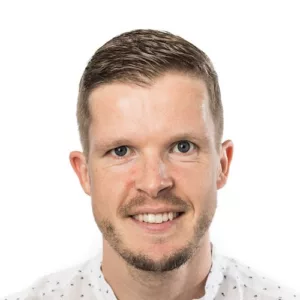The influx of migrants that has started in recent years brings a lot of new talent to the Netherlands. Also, Anastasiia Havriushenko is a young and driven data specialist from Ukraine. She has been in the Netherlands since July and works as a Machine Learning Engineer in the MLops team for KLM. We spoke to Anastasiia about her background and the (forced) turn in her life.
Anastasiia, how did you end up in the Netherlands? “I was born and raised in eastern Ukraine. In 2014, because of the Donbas (Eastern Ukraine, ed.) fighting, I was forced to move to Kyiv, where I worked as a Data Scientist. Unfortunately, the war with Russia broke out at the beginning of this year, and my life changed drastically again.”
Anastasiia fled to Poland, where she worked for her Ukrainian employer until LINKIT approached her. “We came into contact via Telegram and LinkedIn. The interviews inspired confidence, and I decided to make the long trip to the Netherlands.”
How were you received at LINKIT? “Very good,” says Anastasiia. “The onboarding process went smoothly, and they helped me with all the documents, procedures and finding a home of my own.”
Thanks to the variety of nationalities at LINKIT, she felt right at home. “Everyone speaks English, the different cultures make it a special working environment, and it is instructive to approach data from different (international) angles.”
Can you tell us something about your background? “Data has always fascinated me, mainly because of its versatility. After my studies (Mathematics and Statistics, ed.) I worked as a Data Engineer and Data Scientist. I, therefore, call myself a Data Scientist with engineering as an important part.”
She continues: “Because of my background, I know data streams, storages and APIs. Something that comes in handy in the current KLM project because I understand both sides of data and know when which expertise is needed.”
What is the most significant difference between working in Ukraine and the Netherlands? Anastasiia laughs: “The Dutch are very up-to-date and direct in their communication. They are more aloof and let you swim before giving you bands. Ukrainians are much more personal, and as a newcomer, they take you by the hand.”
How do you see the future of data? “Data is and will remain the future,” says Anastasiia. “I find it challenging to help organizations with a targeted business approach, without standardized processes, based on data analyses, self-learning algorithms and machine learning models. And due to the shortage of data specialists, I see a bright future for my field.”
The link to the staff shortage in the Netherlands has been made. Many Dutch companies look for new employees across national borders, which offers talent opportunities, says Anastasiia. “Here (the Netherlands, ed.), everything is arranged down to the last detail. Many international companies are located there, and the level of knowledge and education is very high. Ingredients that provide immigrants (like me) with a good basis to develop yourself as a person and in your field.”
And her future? She is clear about that: back to Ukraine. “The war taught me that long-term goals are not realistic. My short-term focus is on a stable life here, but I hope – when we have won the war – to return to Ukraine to help with the reconstruction and transfer my technological knowledge there.”
Anastasiia (25) lives in Utrecht and has a bachelor’s and master’s degree in Mathematics and Statistics. After working in Ukraine, Poland and Turkey, she is now active as a Machine Learning Engineer at LINKIT.

